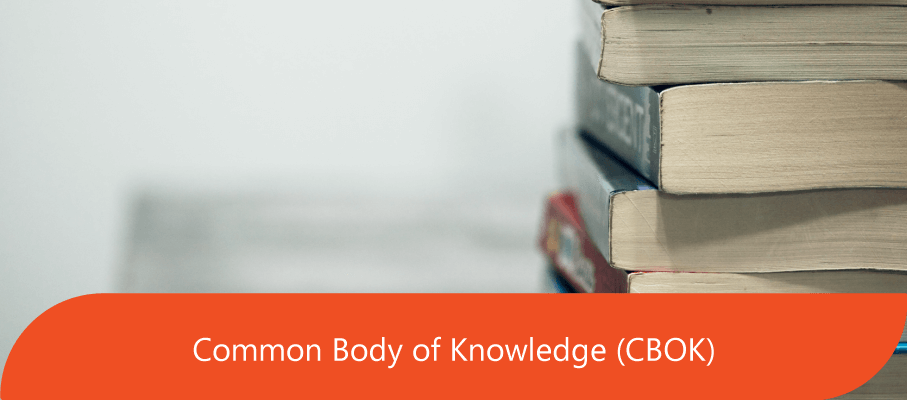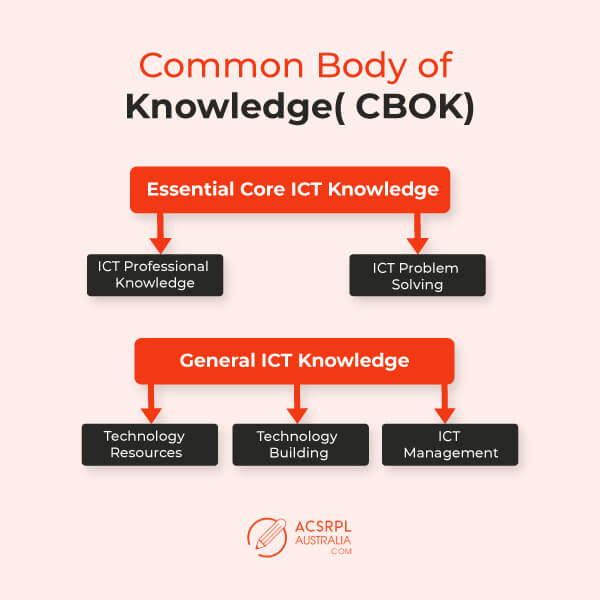
A standard core body of knowledge is defined as a living reference that constitutes collective knowledge. The critical factors explained within are termed “areas of expertise” that reflect practices within the profession. The practices may include associated tasks, activities, and necessary skills for effective execution.
Effective execution and professional standards and guidance are used by the profession’s followers, like the International Professional Practices Framework (IPPF), which includes advice and recommended guidance. The IIA has decided to refer to the common knowledge of the internal audit profession as the Common Body of Knowledge of Internal Auditing.
Section 1
Section 1 is evaluated using the ACS Core Body of Knowledge for ICT Professionals (CBOK). You must mention that your experience and qualifications meet the preferred areas of knowledge.
You also need to specify how and where your experience meets the requirements. Pick one topic from Essential Core ICT Knowledge (Topic 1 or Topic 2) and another from General ICT Knowledge (Topic 3, Topic 4, or Topic 5). You must address at least two subtopics within the chosen topic.
Essential Core ICT Knowledge
As an ICT graduate, you need to understand two knowledge areas: ICT problem-solving and ICT professional knowledge. Any ICT Professionals require Essential Core ICT Knowledge. This topic contains ICT professional knowledge and ICT problem-solving.
History of CBOK
From the beginning of Standards for the Professional Practice of Internal Auditing and the Certified Internal Auditor certification program in the early 1970s. They were focused on internal auditing. First and foremost, CBOK takes place in 1972, accompanied by several projects done by various groups.
In 2005, the Internal Audit Foundation was formed by William G. Bishop III. The fund was supported by CBOK 2006, a comprehensive global study on the internal audit profession. On top of that, the CBOK study was created to build the project and to support the profession in staying appropriate, vigorous, and far-sighted, with regular cyclic research as necessary; the CBOK study came into existence.
The CBOK study provides a diverse overview of how the profession develops, is executed, and is perceived worldwide.
The CBOK study components provide a rich overview of how the profession develops and how it is being practiced and viewed worldwide. The CBOK study contains.
- Conformance with and suitability of the IPPF’s Recent status of the internal audit activity within the company
- Types of Audits and activities being performed
- Internal Auditor’s tools and techniques
- Skills and knowledge of internal audit
- Key Areas of Knowledge of ACS RPL
Topic 1: ICT Professional Knowledge
ICT professional knowledge comprises the following sub-topics:
a. Ethics
It includes fundamental ethical notions like responsibility, harm, benefits, respect, virtues, and consequences. Fundamental ethical theories include the ACS Code of Professional Conduct, ethics committees, methods of ethical analysis; techniques of ethical reflection; procedures of ethical repair and recovery; and ICT-related ethical issues like compromising quality, society, and conflict of interest.
b. Professional expectations
This topic should include expertise, certification, autonomy, brilliance, knowledge, reflection, responsibility, and liability.
c. Teamwork issues and concepts
This topic should cover collaboration, team collaboration, dynamics, leadership, team development, and group work.
d. Communication
This topic should include oral and written presentations, preparing users’ documentation, writing technical reports, and developing interpersonal skills.
e. Societal issues
This topic includes a history of computing and the ICT discipline. Also, it contains other societal issues like privacy and civil liberties, intellectual property, and other legal matters.
Read More: Why is RPL report needed for ICT applicants? 🧠🧠
General ICT Knowledge
Along with ICT knowledge, i.e., problem-solving and ICT professional learning, all ICT candidates must broadly understand the ICT discipline.

Topic 2: ICT Problem Solving
Professionals should know their boundaries and where their discipline begins and ends. Moreover, they should understand the ongoing issues.
It includes various methods and tools for dealing with distractions that vary depending on the branch of ICT, such as circuit diagrams, data modeling tools, and business processing. It is essential to know about these areas, as they show how creativity and innovation are critical for ICT professionals. Understanding and recognizing these factors help to identify the unique factor in the ICT professions.
In other words, this is the only discipline that focuses on developing artifacts like computers and information systems. Since it is abstract, complex tools and techniques are applied.
ICT professionals need help handling direct products of other disciplines like drugs, buildings, bridges, etc. Therefore, high problem-solving skills are required to handle abstraction. Modeling plays a vital role in problem-solving. Its sub-topics are
- Modeling Methods
- Procedure to understand problems
- Methods and tools for handling abstraction
Topic 3: Technology Resources
Technology resources contain the following sub-topics:
a. Hardware and Software Fundamentals
A basic understanding and knowledge of the components of computer systems are necessary, along with knowledge of computer architecture and organization. It includes memory, storage systems, input and output devices, operating systems, application system software, and others.
Learn More: How to avoid RPL rejection from ACS? 💪💪
b. Information and Data Management
An understanding of how data are manipulated, represented, organized, and retrieved from databases and files. This topic includes data modeling and database management systems (DBMS).
Similarly, they also need to provide an environment for shared data; they should know about the nature of data, its guardianship, acquisition, and knowledge transmission through technologies.
c. Networking
Networking is an exciting part of today’s lifestyle. It includes data communications and networking fundamentals. Concepts of Network Protocols and Standards are necessary. Similarly, knowledge of wireless and mobile computing and the distributed system is a must-known factor.
Topic 4: Technology Building
Different topics included in technology building include:
a. Human factors
Every new invention should not affect human factors. Hence, ICT professionals must understand users’ needs while developing applications and systems. It includes tasks like understanding the importance of users, organizational contexts, and their work practices.
b. Programming
Programming means understanding the fundamental concepts of a programming language. However, the programming languages and tools span depending on the ICT job role. It will be best if students understand software development tasks.
c. Information Systems Development and Acquisition
A deep understanding of development is required to satisfy the customer’s or user’s requirements. All stages of the lifecycle of an information system should be understood, along with requirement analysis. The candidate should know the methodologies and processes of system development.
Also, they need to work on the specification, design, construction, testing, operation, and maintenance.
Read More: Career opportunities for ICT support engineer in Australia. ✈️✈️
Topic 5: ICT Management
ICT management contains the following sub-topics:
a. IT Governance and Organizational Problems
This topic covers fundamental governance principles, such as structures to encourage moral behavior within organizations and the moral behavior of corporations.
The candidate must be familiar with the organizational context, including business processes, risk, culture, and changes.
b. IT Project Management
IT Project Management is the managing area that requires depth understanding of project management.
It includes team management, cost/benefit analysis, estimation techniques, risk management and analysis, project scheduling, quality assurance, project management tools, reporting, software configuration, and other presentation techniques.
c. ICT Service Management
Service management is in charge of overseeing the ongoing operation of ICT in an organization. Frameworks like the Information Technology Infrastructure Library (ITIL) and Control Objectives for Information and Related Technology (COBIT) guide ICT service management. It also includes frameworks for shaping the interactions of ICT technical personnel with business users or customers.
d. Security Management
It includes all the computer system security components, like the CPU, peripherals, and OS. It contains three types of security: physical security, operational security, procedural security, and communication security.
Learn More: Document Checklist for ACS Skill Assessment for PR in 2023. 😊😊
Conclusion
Finally, the Core Body of Knowledge (CBOK) is a valuable resource for professionals looking to improve their skills and remain competitive in the job market. It is a valuable tool that should be remembered throughout one’s career.
If you need any assistance in Australian immigration, document preparation, and guidance, we are here to help you to prepare your RPL report and other immigration-related services.
